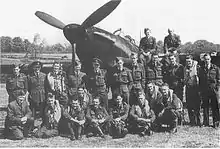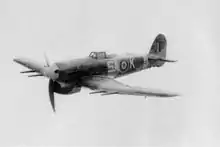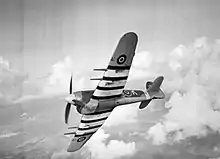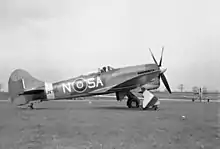No. 486 Squadron RNZAF
486 (NZ) Squadron was a New Zealand fighter squadron of the Royal Air Force during the Second World War. It was formed under Article XV of the Empire Air Training Scheme and served in Europe.
| 486 (NZ) Squadron RAF | |
|---|---|
| Active | 7 March 1942 – 12 October 1945 |
| Country | |
| Allegiance | |
| Branch | |
| Role | Fighter |
| Garrison/HQ | RAF Kirton in Lindsey |
| Motto(s) | Māori: Hiwa hau Maka ("Beware of the Wild Winds") |
| Anniversaries | 7 March 1942 |
| Aircraft | Hurricane, Typhoon, Tempest |
| Insignia | |
| Squadron Badge | A kea volant |
| Squadron Codes | SA (Mar 1942 – Sep 1945)[1][2] |
History

The squadron formed on 7 March 1942, initially at RAF Kirton in Lindsey,[3] Lincolnshire, as part of RAF Fighter Command and equipped with Hawker Hurricane IIs.
For a while 486 Sqn. was a nightfighter unit tasked with working in conjunction with No. 1453 Turbinlite Flight. The radar-equipped but unarmed Turbinlite (Douglas Boston medium bombers with a searchlight in the nose) were to locate and illuminate enemy aircraft at which point an accompanying Hurricane could make the attack.
The squadron was re-equipped with Hawker Typhoons starting in July 1942 and continued the experiments with the Turbinlites.


In September 1942 486 became a day fighter unit flying standing patrols.[5][6] Standing patrol missions ('anti-Rhubarbs') were meant to counter The Fw 190 and Bf 109 fighter bombers that flew at high speed and very low altitude. Because of this there was often very little radar warning. To counter such attacks Typhoon squadrons kept at least one pair of aircraft flying continuously, with another pair "on readiness" (in the cockpit and ready to take off within two minutes) to relieve them, throughout daylight hours. 486 Sqn. Typhoons usually flew at 500 feet or lower, still giving them enough height to spot and attack incoming enemy aircraft to counter the low altitude Fw 190 and Bf 109 fighter bombers, a role for which the fast, powerful Typhoon was well suited.[6] While flying patrols over the South coast against these 'nuisance' raids in early 1943, the squadron shot down 11 fighter-bombers in 2 months. Other enemy aircraft encountered and shot down included Do 217 night bombers engaged in mine laying missions.[7][8][9]
From June 1943, 486 Sqn. flew mainly as a fighter bomber unit. In September 1943, with 197 Sqn 486 Sqn became part of the RAF Tangmere Hawker Typhoon Wing commanded by Wing Commander D J Scott.[10] As a fighter bomber unit 486's targets included shipping and airfields, and an attack on one of Hitler's secret weapons, the Vergeltungswaffe V3 long range multi-barrel gun. Several escort missions were also provided for RAF light and medium day bombers (Havoc and Mitchell). While mounted on Typhoons 486 Sqn claimed 22.3 enemy aircraft shot down.[7][11]

Re-equipped with Hawker Tempests, initially in January – February 1944,[12] and later again in April. Although 486 Sqn was the first unit to receive Tempests, 3 Squadron was the first unit fully equipped. The unit was changed back to fighter defence after D-Day and claimed 223½ V-1 flying bombs, the second highest number of any unit. At the end of April 1944 the 486 squadron became part of No. 150 Wing RAF, along with 3 Squadron and 56 Squadron. (the latter still equipped with Spitfire VBs and, later, Hawker Typhoons), under the command of Wing Commander Roland Beamont.[13] Beamont wrote about 486 Sqn.
"...an exuberant bunch of New Zealanders with a brilliant record on Typhoons and a rather casual approach (as I was soon to find out) to King's Regulations and Air Council instructions – and to "Pommy Bastard" wing leaders!" [14]
Apart from the anti-Diver (V-1) operations, 150 Wing undertook several night-time, as well as the more usual daytime, ground attack sorties.
On 28 September 1944 with the V-1 threat over, 150 Wing became 122 Hawker Tempest Wing, trading places with three Mustang III squadrons.[15][16] Later additions to 122 Wing included 80 Squadron and 274 Squadron; 41 Squadron, a Grffon-engined Spitfire XIV unit was also a part of the Wing, providing high altitude cover. 122 Wing was attached to the Second Tactical Air Force, and moved through Belgium, Holland, Germany, and Denmark. The wing's role was low-medium altitude fighter operations, although many ground attack missions were also undertaken.[17] During these operations German light and medium Flak took a steady toll of Tempest units. 486 lost two commanding officers, Arthur E Umbers and Keith G Taylor-Cannon, to flak in the last few months of the war.[18]
Soon after the war ended, 486 Squadron left 122 Wing and moved to Kastrup in Denmark. This was considered to be a "perk job" and the personnel of 486 were given an opportunity to unwind and relax, with each pilot being expected to log four hours of Tempest flying per month.[19] On 1 July 1945 the squadron took part in an air display and airfield open day which was attended by the Danish Royal Family and some 300,000 Danes. One of the attractions was the strafing and sinking of old Luftwaffe Bv 138 flying boats anchored in Øresund strait.[20]

The squadron was disbanded on 12 October 1945 at RAF Dunsfold, England.[3][21]
486 squadron flew over 11,000 sorties claimed 81 enemy aircraft, (including two Messerschmitt 262 jets) and destroyed 223½ (or 241) V-1 "flying bombs",[22] 323 motor vehicles, 14 railway engines and 16 ships.[23] Pilots attached to the squadron won 22 DFCs,a DSO and six Mentioned in Dispatches.[24] While mounted on Tempests 486 Sqn claimed 59.5 enemy aircraft shot down; first place for Tempest victories. 56 Sqn. was second with 59.2.[25]
By the end of the war nearly 50% of 486(NZ) Squadron's personnel were non-New Zealanders; for example F. Philip "Joe" Kendall, a British national and a highly regarded member of the unit served with the squadron from March to July 1945. Two of 486's commanding officers, Squadron Leaders Roberts (March 1942 – April 1943) and Iremonger (January 1944 – December 1944) were also British.
| From | To | Aircraft | Version |
|---|---|---|---|
| March 1942 | April 1942 | Hawker Hurricane | Mk.I |
| March 1942 | August 1942 | Hawker Hurricane | Mk.IIA, IIB |
| July 1942 | April 1944 | Hawker Typhoon | Mk.IB |
| January 1944 | February 1944 | Hawker Tempest | Mk.V |
| April 1944 | September 1945 | Hawker Tempest | Mk.V |
(A Hawker Tempest Mk.V used by the squadron, "SA-I", EJ693 is being restored by Kermit Weeks in Florida.[28])
| From | To | Name |
|---|---|---|
| 3 March 1942 | 1 April 1943 | S/Ldr. C.L.C. Roberts |
| 1 April 1943 | 25 September 1943 | S/Ldr. D.J. Scott, DFC and Bar |
| 25 September 1943 | 7 January 1944 | S/Ldr. I.D. Waddy, DFC |
| 7 January 1944 | 11 December 1944 | S/Ldr. J.H. Iremonger, DFC. |
| 11 December 1944 | 14 February 1945 | S/Ldr. A.E. Umbers, DFC and Bar. KIA: 14/2/45 |
| 15 February 1945 | 13 April 1945 | S/Ldr. K.G. Taylor-Cannon, DFC. KIA: 13/4/45 |
| 21 April 1945 | 1 May 1945 | S/Ldr. W.E. Schrader, DFC. |
| 2 May 1945 | 12 October 1945 | S/Ldr. C.J. Sheddan, DFC. |
See also
- New Zealand Article XV squadrons (for an explanation of the official status and naming of these units).
References
| Wikimedia Commons has media related to No. 486 (NZ) Squadron RAF. |
Footnotes
- Flintham and Thomas 2003, p. 105.
- Bowyer and Rawlings 1979, p. 92.
- Halley 1988, p. 530.
- Thomas 1999, p. 86.
- Sortehaug 1998, p.32.
- Thomas and Shores 1988, p. 37.
- Sortehaug 1998, pp.339–340.
- In April 1943 F/L A.O Moffet of the RAE Farnborough was attached to the unit in response to complaints about the overheated cockpits of the Typhoons. For a fortnight "Moff" flew operationally with the unit: his report can be found in That Nothing Failed Them. His tests showed that the cockpit temperatures could reach 135 degrees F (57 °C).
- Wheeler 1963.
- Desmond Scott Archived 17 October 2007 at the Wayback Machine Note: Desmond J. Scott OBE, DSO, DFC and Bar. Commanding officer of 486 Squadron 1 March 1943 – 25 September 1943. Awarded DSO 22 August 1943. Promoted to Wing Commander 25 September 1943 and became Wing Leader of RAF Tangmere Hawker Typhoon Wing (197 Squadron. and 486 Sqn.). Promoted to Group Captain and C/O 123 Hawker Typhoon Wing 3/44 – 2/45. (123 Wing during Scott's command was made up of 198 Squadron., 609 Squadron, 164 Squadron. and 183 Squadron.).
- Thomas and Shores 1988, p. 193: "Breakdown of Claims by Unit and Type: Typhoons".
- Rawlings 1978, p. 451.
- Sortehaug 1998, p.145.
- Beamont Tempest Summer: Part 1, p.21.
- Sortehaug 1998, p.177
- Thomas and Shores 1988, p. 180.
- few Tempests carried bombs; ground attack operations mainly involved strafing with the Tempest's four Hispano 20mm cannon.
- Sortehaug 1998, pp.218–219, 242–243, 334.
- Sortehaug 1998, pp.281–283.
- Sortehaug 1998, pp.289–290
- Sortehaug 1998, p.296.
- Note: Although 486 Sqn pilots claimed 241 V-1s, RAF authorities reduced this to 223½; in spite of this the individual pilot's scores remained unaltered, as did the squadron scoreboard. Sortehaug 1998, pp.172–173.
- Sortehaug 1998, pp.338–352
- Sortehaug 1998, p.336.
- Thomas and Shores 1988, p. 193: "Breakdown of Claims by Unit and Type: Tempests".
- Rawlings 1978, pp. 451–452.
- Jefford 2001, p. 95.
- Kermit Weeks
- Sortehaug 1998, p.337.
- Rawlings 1978, p. 452.
- New Zealand Electronic Text Centre
Bibliography
- Sortehaug, Paul. The Wild Winds, The History of Number 486 RNZAF Fighter Squadron with the RAF. Dunedin, New Zealand: Otago University Print 1998. ISBN 1-877139-09-2.
- Scott, Desmond. Typhoon Pilot. London: Arrow Books Ltd., 1982. ISBN 0-09-950700-5. Republished 1992, London: Leo Cooper, ISBN 0-436-44428-3.
- Scott, Desmond. One More Hour. London: Arrow Books Ltd., 1989. ISBN 0-09-984440-0.
- Sheddan, Cornelius James and Franks, Norman. Tempest Pilot. London: Grub Street Publishing, 1993. ISBN 1-904010-38-5.
- Beamont, Roland. "Tempest Summer: part one". Aeroplane Monthly, Volume 20, Number 6, Issue No. 230, June 1992.
- Thomas, Chris. Typhoon and Tempest Aces of World War 2. London: Osprey Aerospace, 1999. ISBN 1-85532-779-1.
- Thomas, Chris and Shores, Christopher. The Typhoon and Tempest Story. London: Arms and Armour Press., 1988. ISBN 0-85368-878-8.
- Bowyer, Michael J.F. and John D.R. Rawlings. Squadron Codes, 1937–56. Bar Hill, Cambridge, UK: Patrick Stephens Ltd., 1979. ISBN 0-85059-364-6.
- Flintham, Vic and Andrew Thomas. Combat Codes: A Full Explanation and Listing of British, Commonwealth and Allied Air Force Unit Codes since 1938. Shrewsbury, Shropshire, UK: Airlife Publishing Ltd., 2003. ISBN 1-84037-281-8.
- Halley, James J. The Squadrons of the Royal Air Force & Commonwealth, 1918–1988. Tonbridge, Kent, UK: Air-Britain (Historians) Ltd., 1988. ISBN 0-85130-164-9.
- Jefford, C.G. RAF Squadrons, a Comprehensive Record of the Movement and Equipment of all RAF Squadrons and their Antecedents since 1912. Shrewsbury: Airlife Publishing, 2001. ISBN 1-84037-141-2.
- Morris, Gerard S. Spitfire, the New Zealand Story. Auckland, New Zealand: Reed Books, 2000. ISBN 0-7900-0696-0.
- Rawlings, John D.R. Fighter Squadrons of the RAF and their Aircraft. London: Macdonald and Jane's (Publishers) Ltd., 1969 (new edition 1976, reprinted 1978). ISBN 0-354-01028-X.
- Wheeler, Air Commodore Allen. That Nothing Failed Them. London: G.T. Foulis & Co. Ltd., 1963.
- Thompson, Wing Commander H.L. New Zealanders with the Royal Air Force (Vol I): European Theatre September 1939 – December 1942. Wellington, New Zealand: War History Branch, Department of Internal Affairs, 1953. ISBN N/A
- Thompson, Wing Commander H.L. New Zealanders with the Royal Air Force (Vol II): European Theatre January 1943 – December 1945. Wellington, New Zealand: War History Branch, Department of Internal Affairs, 1956. ISBN N/A
External links
| Wikimedia Commons has media related to No. 486 (NZ) Squadron RAF. |
- New Zealand Fighter Pilot's Museum (NZFPM) article on 486 Sqn. Retrieved:25 February 2009.
- New Zealanders with the Royal Air Force (Vol I) online
- New Zealanders with the Royal Air Force (Vol II) online
- Article on 486 Sqn. pilot C J Sheddan
- Article on 486 Sqn K G Taylor-Cannon
- Article on 486 Sqn. pilot A E Umbers
- Information on restoration of Tempest V SA-I EJ693 Retrieved:25 February 2009.
- Photographic "walk-around" of EJ693 Retrieved:25 February 2009.
- Map of 486(NZ) Squadron sorties 1945